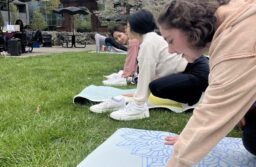
Photo by SGA Sustainability Committee
On Feb. 25, the Sustainability Committee of the Student Government Association invited Dr. Chuck Stead to present "On an Inside History of the Ramapough Lunaape Peoples." Stead grew up surrounded by the influence of Indigenous Americans, and throughout his life, he has worked to defend their land, their rights and their stories.
His close relationship with the Ramapough Mountain Indians stemmed from his grandfather living in a small town where most people worked at the same iron forge. His grandfather, his father and subsequently Stead were heavily influenced by their culture, including their spiritual beliefs.
Stead grew up practicing animism like his father and Catholicism like his mother, which created conflict at his Catholic school. His favorite teacher asked him to present to students about the survival skills he had learned from the Ramapoughs. Stead said at first it was enjoyable.
“In that moment I became a storyteller,” Stead said. “I became an educator.” His principal heard him reference animism and banned him from all future presentations.
“You live in two worlds, and one of them doesn’t much like the other one,” his father said when Stead questioned his parents about the principal’s reaction. That comment, plus the unsurprised reactions of his native friends when he shared the story with them, deepened his understanding of racism.
Following the incident, Stead continued to attend Catholic school for his mother’s sake on the condition that she would give him more freedom to do what he wanted in his off time. He spent most of it with the nearby Ramapoughs in the woods.
“That was my real classroom,” Stead said. “The influence that I got from the Ramapoughs was up until age 12. The actual education started from that moment on.”
What he learned from them extended beyond lessons on how to pull ticks and avoid the areas where Ford trucks dumped paint. Stead also became accustomed to using animal medicine and being open to spiritual experiences. When he was 10 years old, he was bitten by a fox and experienced a vision.
“The fox is in him now, that’s fox medicine,” Elder Ramapough women said to him when he shared his experience with them.
Looking back on the experience, Stead realized the fox had developed hypospadias from the paint that had been dumped by Ford. The dumping grounds have had negative effects on the native wildlife and people for decades, and Stead himself fought cancer due to spending so much time in the area. Leading a campaign to clean up the area and ensure the crimes of the company were not forgotten was a way of giving back.
“My story is that the animals were teachers, but they weren’t traditional teachers so I didn’t always recognize them,” he said. “I was just fortunate enough to be in their presence.”
He holds similar feelings about the Ramapough Elders who taught him so much. He recognized his white privilege and is grateful to have been given a chance to deepen his sensitivity to their experiences and work with them in keeping their history alive and accurate.
The Ramapough Mountain People have a rocky history with white academics misrepresenting their culture and past. After David Cohen published the inflammatory book, "The Ramapough Mountain People," they restructured their clans as a protest to him lying and excluding their stories. Today, Chief Mann of the Turtle Clan works to catalogue the records Cohen ignored.
In the early '90s, the mayor of Hillburn worked to collect video recordings from the Deer Clan to create a truthful archive, but the videos have been misplaced. Professor Charles Carreras, an event participant, announced that he was a member of an effort to find the recordings by 2022 and publicize them to aid in recording Ramapough history. Professor Mike Edelstein added how he has proposed several ideas for how Ramapo College can play an active role in filling the historical gaps.
The event wrapped up with Zoë Tucker-Borrut, the secretary of sustainability for the Student Government Association, inviting Stead to continue the conversation this Thursday, March 11. Stead will be hosting another event at 1 p.m. which will act as a continuation of "On an Inside History of the Ramapough Lunaape Peoples."
This link can be found here, but if you can't attend, his book "Get the Lead Out" is available at the campus bookstore.
dbongiov@ramapo.edu





